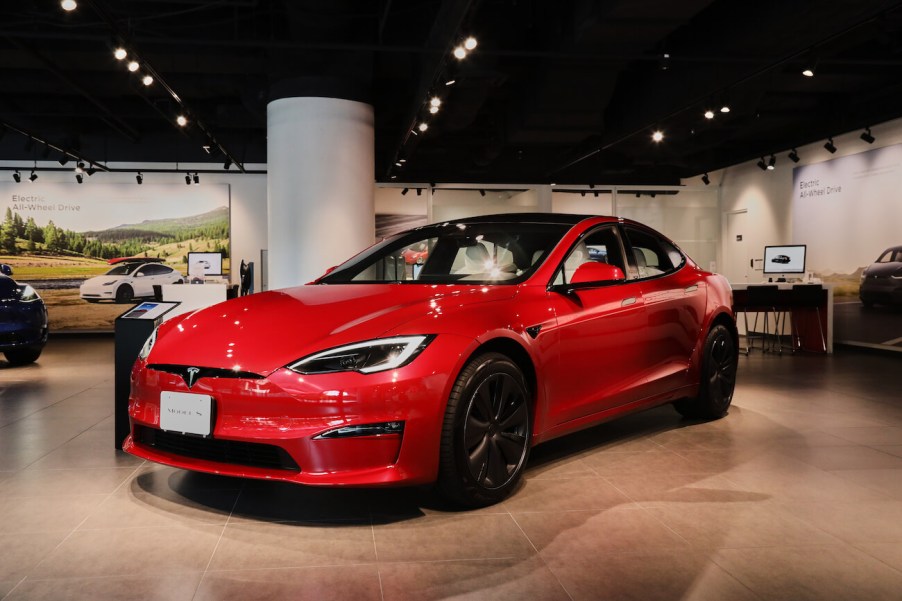
2023 Study Shows Electric Vehicles Are Worst for Resale Value
In this article:
As electric vehicles start to age, we’re beginning to understand more about the used market for all-electric cars. And while EVs carry a high initial price tag compared to most hybrids, resale values don’t line up with that up-front cost. A new study, published in 2023, finds that electric vehicles are worse for depreciation than hybrids.
EVs lose nearly half their value in just 5 years

A recent study from automotive market research firm iSeeCars analyzed over 1 million vehicles sold from November 2022 to October 2023. It found that, overall, electric vehicles are the worst vehicle segment for resale value.
In just five years, the average EV will lose 49.1% of its value. Meanwhile, hybrids are among the best segment for resale values, losing just 37% in the first five years of ownership. Worse yet, the average depreciation among all segments is 38.8%, so the 49.1% loss in EV value is a true outlier.
EV depreciation is getting better, but it’s still the worst
The same outfit performed a similar study in 2022. At that time, it found electric vehicle depreciation was staggering at 67.1%, while hybrid resale value was 56.7%. Market trends have shifted since then, and every measured vehicle category improved deprecation from 2022 to 2023.
However, EVs were among the most improved for depreciation, with 18% better values than a year ago. Only hybrids did better, improving by 19.3% from 2022 to 2023. That said, it’s good news for buyers. Used EVs are getting cheaper, so you can try to go electric without such a hefty up-front cost.
What is the worst EV for resale value?

Despite its status as the OG of modern EVs, the Tesla Model S is the worst EV for resale value. Posting a 55.5% value loss in five years, it ranks worst of all EVs and is the 19th worst of all vehicles sold for depreciation. The value loss in dollars is $60,145, making it both a poor value and a big financial hit.
The Model S isn’t alone, however. The Chevy Bolt EV is the second-worst for resale value, losing 51.1%, while the Leaf and Tesla Model X each hover around 50% depreciation. Rounding out the top 5 worst EVs for resale value is the Tesla Model 3 at 42.9%.
Tesla depreciation isn’t all down to quality
Tesla, as ever, is a complex beast. Its market value isn’t simply tied to its vehicles. There is also a cultural sentiment surrounding the brand thanks to Elon Musk’s controversial social and political statements. Furthermore, Tesla’s that sold high-value add-ons like “Autopilot” and “Full Self-Driving” drove up initial purchase prices. However, those features are now under investigation and Tesla recalled over 360,000 vehicles equipped with the tech in March.
Since then, CNBC reports, NHTSA’s investigation asked for more extensive data regarding its not-quite-autonomous tech.
Moreover, Tesla began slashing prices on its EVs early in 2023. This has the knock-on effect of kneecapping resale values for existing Tesla models, regardless of their initial purchase price.
Finally, continuing issues with Tesla build quality, lack of adequate service centers, and a bevy of new EV competition means that Tesla cars no longer have the same market advantage as five years ago.
Are EVs really a bad value?

Overall, EVs aren’t as bad a value as this iSeeCars study would indicate. Multiple market factors and specific issues around Tesla may be unfairly weighing how poor EVs perform. And because there are so few EVs out there, Tesla’s four-model lineup tanking weighs down the entire segment. Compounding the issue is that most EVs are luxury cars, which also depreciate more quickly than economy vehicles. Overall, a new EV isn’t necessarily a bad value, especially as the market warms up to this new tech.




